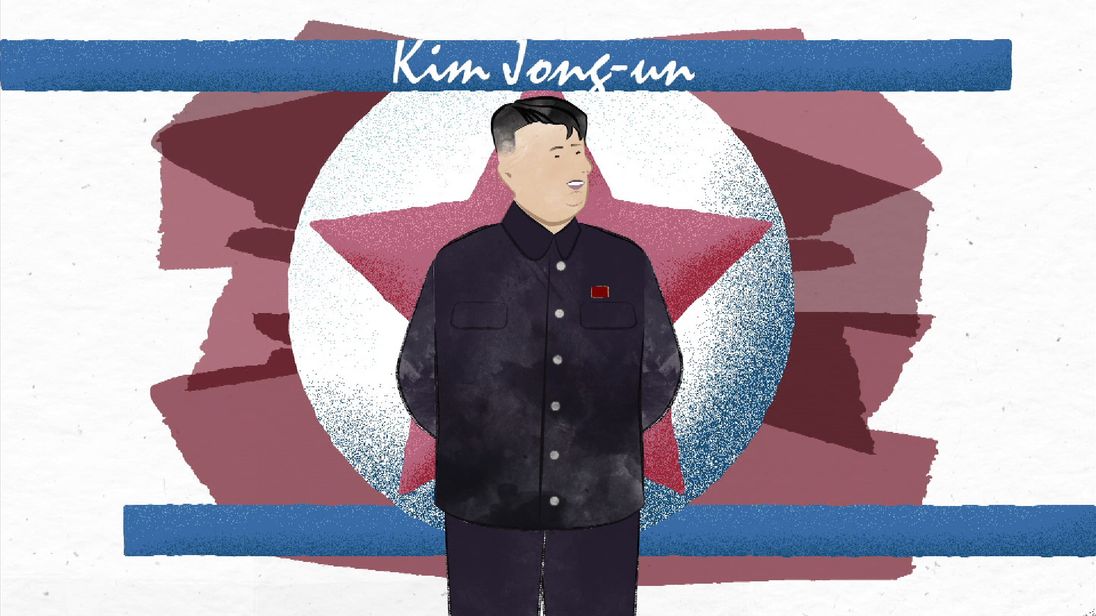In the North Korean version of this story, their leader is not the aggressor, he is the hero.
People there are not told that Kim Jong Un's grandfather, Kim Il Sung, started the Korean war – they are told that they were attacked by the United States, and their "puppet war maniacs" in South Korea, and that only their president's tactical brilliance saved them.
The history is false, but the devastation that followed was real – more US bombs were dropped on North Korea than in the entire Pacific theatre during World War II, including 32,000 tonnes of napalm, with large parts of the country reduced to ruins.
Successive generations of Kim leaders have presented their nuclear programme as the only means to stop this happening again – a necessary defensive measure to deter US aggression, and ensure the country's survival.
One senior regime official explained to me last year that they had learned the lessons of the past, and noted recent US actions in Afghanistan and Libya – "the only way to protect our country is to strengthen our power," Ambassador Choe Il said, "This was a lesson we felt in our bones."
A more graphic lesson in what happens when you give up your nuclear weapons could be found in the fate of Saddam Hussein and Muammar Gaddafi, who ended their days respectively in a hangman's noose, and dragged out of a drainage ditch by a baying mob.
So the notion that Kim Jong Un is about to voluntarily hand over his nuclear weapons, even when confronted with the ultimate dealmaker president, seems somewhat fanciful.
South Korean officials say that denuclearisation is on the table, but in reality the conditions that would likely be attached to that outcome would include the end of US-South Korea military exercises, and the withdrawal of US troops from the Korean peninsula, neither of which is likely to be palatable.
Instead, the lesson the Trump administration may inadvertently be delivering is that nuclear blackmail works.

Talks with Kim Jong Un are being presented as some sort of breakthrough – evidence that President Trump's strategy of sanctions and "maximum pressure" has worked and forced North Korea to the negotiating table, but to be clear – this is where Kim wants to be.
The North Korean leader, like his father before him, wants to sit down as an equal to talks with a US president – as the leader of one nuclear power to the other.
This could have been held out as the end goal of preliminary talks – that if enough progress was made, and North Korea proved it was serious – the presidential summit would be something to work towards.
Instead, inexplicably, it seems to be being offered as the starting point.
It's difficult to see what concessions North Korea is offering – pausing tests on a nuclear and missile programme you have previously declared complete, and which serious analysts believe has now achieved the credible capability to reach the US mainland, is not a major sacrifice.
Similarly, accepting that annual US-South Korea drills will go ahead without protest is something, and it does help to break the cycle of escalation, but it is also not exactly a breakthrough.
So, for giving up not very much, it seems Kim Jong Un may be about to get something he very much wants, and with it, the chance to kick the prospect of denuclearisation a little further down the road, as the mythical endpoint of perhaps many years of dialogue and mutual building of trust.
Meanwhile Kim could get on with the other part of his "Bgyungjin" or parallel advance strategy, developing the economy, perhaps with aid from the south.
More from Donald Trump
This may be in all of our interests.
Here in the real world, away from the zero sum rhetoric on twitter, there is no military solution, there hasn't been for decades – talks are imperfect, and the results are unlikely to result in immediate tweetable "wins", but they are also the only way to move this situation away from the brink, and make what had been an increasingly dangerous situation safer.
[contf] [contfnew] 
Sky News
[contfnewc] [contfnewc]






